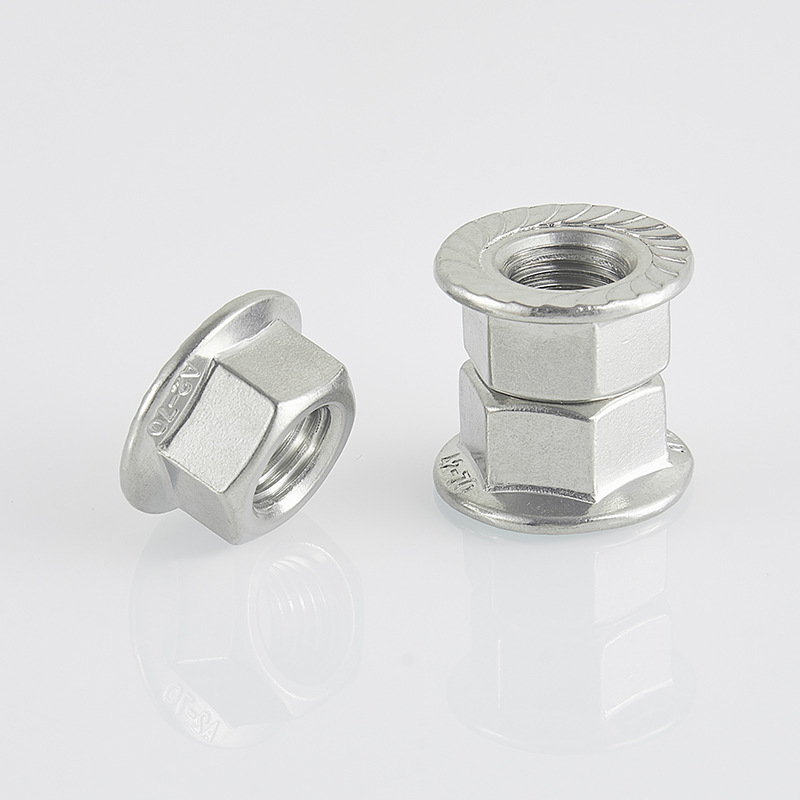

fine thread flange nuts
Dec . 21, 2024 05:01 Back to list
fine thread flange nuts
The Essential Guide to Fine Thread Flange Nuts
In the world of mechanical engineering and construction, the importance of fasteners cannot be overstated. Among the numerous types of fasteners available, fine thread flange nuts stand out for their unique design and functionality. This article will delve into the characteristics, benefits, applications, and best practices related to fine thread flange nuts, thus providing a comprehensive understanding for engineers, manufacturers, and DIY enthusiasts alike.
Understanding Fine Thread Flange Nuts
Fine thread flange nuts are specialized fasteners characterized by their fine pitch threads and a wide circular flange that provides a larger bearing surface against the material being fastened. The fine threads provide higher tensile strength and greater resistance to loosening under vibration compared to coarse threads, making them ideal for various rigorous applications.
The flange feature of these nuts distributes the load over a larger area, reducing the chances of damage to softer materials and providing stability in assembly. This design makes them particularly useful in applications where space is limited, or where a secure fit is critical.
Advantages of Fine Thread Flange Nuts
1. Enhanced Tension and Strength The fine threading allows for more threads per inch, leading to higher tensile strength and effective load distribution. This attribute makes them suitable for high-strength applications where safety and reliability are critical.
2. Vibration Resistance Most mechanical systems experience some degree of vibration. Fine thread flange nuts are less likely to loosen under these conditions, making them a preferred choice in automotive and aerospace applications, where safety is a priority.
3. Improved Load Distribution The flange design helps distribute the load over a wider area. This feature minimizes the risk of damage to the surfaces being fastened, particularly in softer materials such as plastics or thin metals.
4. Easier Installation Due to the larger surface area of the flange, these nuts are easier to grip and turn, allowing for quicker installation and removal compared to standard nuts.
Common Applications
Fine thread flange nuts are widely used across various industries, including
fine thread flange nuts

- Automotive In vehicles, where components must withstand vibrations and dynamic loads, these nuts are often used in engines, suspensions, and chassis assemblies.
- Aerospace Given the critical nature of aerospace applications, fine thread flange nuts are employed in assembling aircraft and spacecraft components, ensuring reliability and safety.
- Construction In structural applications, these nuts are used to secure steel beams and trusses, providing strength and stability to buildings and other infrastructures.
- Manufacturing Equipment They are common in assembly lines, securing parts of machines that require precise alignment and strength.
Best Practices for Use
To maximize the effectiveness and lifespan of fine thread flange nuts, it's essential to follow certain best practices
1. Use Proper Torque Specifications As with any fastener, using the correct torque during installation is crucial. Over-tightening can lead to stripping threads or even breaking the nut.
2. Choose the Right Material Fine thread flange nuts can be made from various materials, including steel, stainless steel, and brass. Selecting the right material for the specific environment (i.e., exposure to moisture or chemicals) can prevent corrosion and enhance durability.
3. Inspect Regularly Regular inspections can help identify wear and tear, ensuring that any compromised nuts are replaced promptly, thus maintaining the integrity of the entire assembly.
4. Avoid Over-lubrication While some lubrication aids in assembly and helps prevent galling, excessive lubrication can lead to slippage and improper tensioning.
Conclusion
Fine thread flange nuts are valuable components in various fastening applications, offering remarkable benefits in strength, stability, and ease of use. By understanding their characteristics and employing best practices, engineers and manufacturers can ensure the safety and reliability of their projects. Whether in automotive, aerospace, or construction, these nuts play a vital role in assembling secure and durable structures. As technology evolves, the application of fine thread flange nuts will undoubtedly expand, making them an essential component in modern engineering.
Latest news
-
High-Strength Hot-Dip Galvanized Bolts-Hebei Longze|Corrosion Resistance&High Strength
NewsJul.30,2025
-
Hot Dip Galvanized Bolts-Hebei Longze|Corrosion Resistance&High Strength
NewsJul.30,2025
-
Hot Dip Galvanized Bolts - Hebei Longze | Corrosion Resistance, High Strength
NewsJul.30,2025
-
High-Strength Hot Dip Galvanized Bolts-Hebei Longze|Corrosion Resistance, Grade 8.8
NewsJul.30,2025
-
Hot Dip Galvanized Bolts-Hebei Longze|Corrosion Resistance,High Strength
NewsJul.29,2025
-
High-Strength Hot Dip Galvanized Bolts - Hebei Longze Metal Products Manufacturing Co., Ltd.|corrosion resistance&high strength
NewsJul.29,2025

